Intr_version
 Here is another album from Intr_version that perfectly conforms to my expectations. I first heard The Beans on the label's excellent Saturday Morning Empires compilation, where their "May 6th Expires" served as the closing track, a gentle, rain-saturated drift-off that managed to sound both out-of-place among label's dominant electronic artists and also very apt, as a summary of the melancholic mood-building available throughout everything I've heard from the label yet. With this, their fifth proper release, the group has made a record whose spectral, narcotic beauty I feel instantly like I've heard many times before, but will never grow tired. The Beans are from Canada, and it's hard not to align their music, however slightly, with fellow countrymen Godspeed You! Black Emperor. Bassplayer is four long "rock" instrumentals driven by the same kind of simple, sad, two-chord meditations that Godspeed layers high with the swooning textures and the odd cryptic political snippets to create their signature effect. The Beans approach the same medium with fewer musicians, a looser stylistic palette, and much less bombast. Their slow, low-rising pieces seem—like Godspeed's—to touch on very familiar, almost basic melodic components, but without as much heart-stringing, making them better open to interpretation—if not quite subversive or challenging content-wise. Nothing is particularly new about the group's style or methods; however these songs speak for themselves, as "May 6th Expires" did as the finale of Intr_version's sampler. Included here as the first track in longer form, the song saturates from the first second, an almost note-less, reverb-expanded bassline brimming and coating each lazy, jazzy slide of the guitars, hooked into each other as if guarding against a very real threat of disintegration, a feeling notably lacking from the work of Godspeed and other post-rock groups where the studied, forced character of songs often ruins their potential for dramatic intensity. Bassplayer benefits from production that retains a live feel, emphasizing the endurance and conviction of the players while making the layered crescendos of the music all the more impressive. My first thought when hearing The Beans was actually a similarity to Australia improvisers The Necks, not so much in direct tonal relationship or even in the music's structural intent, but The Necks work within a similar slow-enfolding, immersive environment in which a song's parts reveal themselves as dependent without a sense of hierarchy. And though The Beans' discography does include three film scores, they refuse the visual dependencies of most things termed "cinematic." While much of this music captures a certain melancholic urgency that could serve the right film very well, it's hard to tell if this is not simply a part of the familiarity, the comfort I find in the music. Bassplayer is special in that it takes comfortable, almost predictable associations and offers the opportunity of living inside them for a short time, a kinetic edge usually denied music of such lateral calm and tender restraint.
Here is another album from Intr_version that perfectly conforms to my expectations. I first heard The Beans on the label's excellent Saturday Morning Empires compilation, where their "May 6th Expires" served as the closing track, a gentle, rain-saturated drift-off that managed to sound both out-of-place among label's dominant electronic artists and also very apt, as a summary of the melancholic mood-building available throughout everything I've heard from the label yet. With this, their fifth proper release, the group has made a record whose spectral, narcotic beauty I feel instantly like I've heard many times before, but will never grow tired. The Beans are from Canada, and it's hard not to align their music, however slightly, with fellow countrymen Godspeed You! Black Emperor. Bassplayer is four long "rock" instrumentals driven by the same kind of simple, sad, two-chord meditations that Godspeed layers high with the swooning textures and the odd cryptic political snippets to create their signature effect. The Beans approach the same medium with fewer musicians, a looser stylistic palette, and much less bombast. Their slow, low-rising pieces seem—like Godspeed's—to touch on very familiar, almost basic melodic components, but without as much heart-stringing, making them better open to interpretation—if not quite subversive or challenging content-wise. Nothing is particularly new about the group's style or methods; however these songs speak for themselves, as "May 6th Expires" did as the finale of Intr_version's sampler. Included here as the first track in longer form, the song saturates from the first second, an almost note-less, reverb-expanded bassline brimming and coating each lazy, jazzy slide of the guitars, hooked into each other as if guarding against a very real threat of disintegration, a feeling notably lacking from the work of Godspeed and other post-rock groups where the studied, forced character of songs often ruins their potential for dramatic intensity. Bassplayer benefits from production that retains a live feel, emphasizing the endurance and conviction of the players while making the layered crescendos of the music all the more impressive. My first thought when hearing The Beans was actually a similarity to Australia improvisers The Necks, not so much in direct tonal relationship or even in the music's structural intent, but The Necks work within a similar slow-enfolding, immersive environment in which a song's parts reveal themselves as dependent without a sense of hierarchy. And though The Beans' discography does include three film scores, they refuse the visual dependencies of most things termed "cinematic." While much of this music captures a certain melancholic urgency that could serve the right film very well, it's hard to tell if this is not simply a part of the familiarity, the comfort I find in the music. Bassplayer is special in that it takes comfortable, almost predictable associations and offers the opportunity of living inside them for a short time, a kinetic edge usually denied music of such lateral calm and tender restraint.
samples:


 I'm quite sure a devilish tailor is making its way through my eardrums every time I put this record on. It's not that there's anything evil about this record; but every instance of sound is a rapidly moving panorama of subconscious and dream-like sounds accelerated through time and set to explode upon aural reception. Blevin Blectum's newest record plays like a billion ping pong balls shot into a room about three inches wide and tall. The result is a barrage of micro-sounds that weave themselves together to make patterns of pseudo-melody and hushed excursions into the clouded heart of glass machines. At times Magic Maple is propelled by a turbine engine bent on choking some kind of rhythm out of the random chaos of sounds assembled into each song and at other times it's a playful cascade of rushing sounds, skipping semi-percussion, time-distorted bits of radio interference, various vocal samples, and unknown instruments bent and snapped into unrecognizable alien keyboards. Blectum's songs never fall into any recognizable format nor do they rely on any one technique; each song plays like a small portion of something greater that, if it could all be heard at once, would reveal some grand, majestic schematic that can only be hinted at when received through typical, human ears. What's more, Blectum's chaos is catchy: at times a xylophone or inter-dimensional steel drum fades in and out of the mix to reveal bits of repeated melody and mutant rhythms that never quite find their own pace. It's an addicting kind of music because it doesn't look to typical song structures to make it enjoyable, but it also doesn't go overboard and exist somewhere on the edge of sonic tolerance and pure experimental recording. It's almost pointless to talk about these songs individually; most of the time I can't tell where one song ends and the next begins. Everything fits together perfectly, but the whole album modulates within itself and never gets boring or frustrating in all its bouncing glory. The end of the album, however, is particularly outstanding and there are moments when just the smallest changes made by Blectum are breathtaking. Of course, these moments don't last long because she just never bothers to sit still.
I'm quite sure a devilish tailor is making its way through my eardrums every time I put this record on. It's not that there's anything evil about this record; but every instance of sound is a rapidly moving panorama of subconscious and dream-like sounds accelerated through time and set to explode upon aural reception. Blevin Blectum's newest record plays like a billion ping pong balls shot into a room about three inches wide and tall. The result is a barrage of micro-sounds that weave themselves together to make patterns of pseudo-melody and hushed excursions into the clouded heart of glass machines. At times Magic Maple is propelled by a turbine engine bent on choking some kind of rhythm out of the random chaos of sounds assembled into each song and at other times it's a playful cascade of rushing sounds, skipping semi-percussion, time-distorted bits of radio interference, various vocal samples, and unknown instruments bent and snapped into unrecognizable alien keyboards. Blectum's songs never fall into any recognizable format nor do they rely on any one technique; each song plays like a small portion of something greater that, if it could all be heard at once, would reveal some grand, majestic schematic that can only be hinted at when received through typical, human ears. What's more, Blectum's chaos is catchy: at times a xylophone or inter-dimensional steel drum fades in and out of the mix to reveal bits of repeated melody and mutant rhythms that never quite find their own pace. It's an addicting kind of music because it doesn't look to typical song structures to make it enjoyable, but it also doesn't go overboard and exist somewhere on the edge of sonic tolerance and pure experimental recording. It's almost pointless to talk about these songs individually; most of the time I can't tell where one song ends and the next begins. Everything fits together perfectly, but the whole album modulates within itself and never gets boring or frustrating in all its bouncing glory. The end of the album, however, is particularly outstanding and there are moments when just the smallest changes made by Blectum are breathtaking. Of course, these moments don't last long because she just never bothers to sit still. In an attempt to Google up some information about this new project from Jens Massel (previously known for his work as Kandis & Senking) and Michael Cramm, I learned that the original Poto & Cabengo were a pair of identical twin girls—real names Grace & Virginia Kennedy—who spoke to each other in their own secret language for the first decade of their lives. What this has to do with this record is a mystery to me, but it's an interesting bit of trivia nonetheless. Interesting is a good word to describe this album which Massel & Cramm describe as their tribute to the sounds of country & folk music. While the idea of European electronic artists being influenced by American roots music may seem strange, there are precedents such as O Yuki Conjugate and Dead Hollywood Stars. Unlike those earlier examples, Poto & Cabengo tend to stick a little closer to the traditions of the genres, with plenty of pluckin' and singin' sitting alongside the pretty electronic melodies. It's an approach that works more often than not, although the latter part of the record is marred by the bizarre "Suevian Rhapsody," which features a nonsensical combination of croaked spoken vocals and a variety of dialogue samples from movies and television. This is a unique and fun release, and at a compact 36 minutes in length, it wraps up before the concept gets beaten to death.
In an attempt to Google up some information about this new project from Jens Massel (previously known for his work as Kandis & Senking) and Michael Cramm, I learned that the original Poto & Cabengo were a pair of identical twin girls—real names Grace & Virginia Kennedy—who spoke to each other in their own secret language for the first decade of their lives. What this has to do with this record is a mystery to me, but it's an interesting bit of trivia nonetheless. Interesting is a good word to describe this album which Massel & Cramm describe as their tribute to the sounds of country & folk music. While the idea of European electronic artists being influenced by American roots music may seem strange, there are precedents such as O Yuki Conjugate and Dead Hollywood Stars. Unlike those earlier examples, Poto & Cabengo tend to stick a little closer to the traditions of the genres, with plenty of pluckin' and singin' sitting alongside the pretty electronic melodies. It's an approach that works more often than not, although the latter part of the record is marred by the bizarre "Suevian Rhapsody," which features a nonsensical combination of croaked spoken vocals and a variety of dialogue samples from movies and television. This is a unique and fun release, and at a compact 36 minutes in length, it wraps up before the concept gets beaten to death.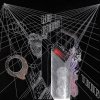 Also on the short side—but decidedly not as fun—is the third album from French musician, vocalist and poet Toog. The record is intended to be a modern variation on Poems For Lou, a book written during World War I by poet and soldier Guillaume Apollinaire who was inspired by a woman named Lou that he loved and lost in Nice before the war. In Toog's version, the role of the muse is played by actress Asia Argento, and WWI is replaced by the war and terrorism of the post-9/11 world. It's impossible for me to verify if Toog's words truly reflect these themes, as aside from two pieces that are sultrily spoken by Argento, all of the readings are in French, a language that I remember very little of from my lessons of many years ago. At least the music, which is produced by French sound artist Digiki, is generally quite nice, mixing together elements of downtempo electro & ambient with low-key pop & hip-hop, and even some hints of industrial, classical and cabaret. Given the strong poetic theme of the work, however, it's quite obvious that without some understanding of the words, listeners just won't get the full message that Toog is trying to convey in the 10 tracks on 'Lou Etendue'.
Also on the short side—but decidedly not as fun—is the third album from French musician, vocalist and poet Toog. The record is intended to be a modern variation on Poems For Lou, a book written during World War I by poet and soldier Guillaume Apollinaire who was inspired by a woman named Lou that he loved and lost in Nice before the war. In Toog's version, the role of the muse is played by actress Asia Argento, and WWI is replaced by the war and terrorism of the post-9/11 world. It's impossible for me to verify if Toog's words truly reflect these themes, as aside from two pieces that are sultrily spoken by Argento, all of the readings are in French, a language that I remember very little of from my lessons of many years ago. At least the music, which is produced by French sound artist Digiki, is generally quite nice, mixing together elements of downtempo electro & ambient with low-key pop & hip-hop, and even some hints of industrial, classical and cabaret. Given the strong poetic theme of the work, however, it's quite obvious that without some understanding of the words, listeners just won't get the full message that Toog is trying to convey in the 10 tracks on 'Lou Etendue'. After several releases for various labels, this German duo release their first full length for Ant-Zen. The album covers a wide variety of styles and textures in a concise 42 minutes. Over eight tracks they attempt to achieve a balance between melodic and abrasive elements.
After several releases for various labels, this German duo release their first full length for Ant-Zen. The album covers a wide variety of styles and textures in a concise 42 minutes. Over eight tracks they attempt to achieve a balance between melodic and abrasive elements. In an era when so many guitarists have taken to laptop processing in order to coax new life from their thought-tired instruments, it seems only fair that other solo-instrumentalists should join the fun. And while the cello has enjoyed its fair share of fusion within the rock sphere, I've yet to see someone sit alone with this instrument, so engorged with classical and acoustic traditions, and really "plug in." Part of what makes Arnold Haberl's output as Noid so fascinating is the way the Austrian cellist moves beyond a banal, deconstructivist treatment of his playing and into ideas for composition where the computer feels less like a medium guiding the production of a piece and more like a voice within the music, to be engaged and countered, rather than simply played-through. Haberl's pieces branch off of strict minimalist ideas, bypassing crude layering techniques of the analog past and instead favoring tightly-wound, stuttering loop effects, drawn out often to the realm of nauseous formalism. Rarely is any multi-tracking involved in Noid's creations; rather miniature fragments of playing are captured, treated, and allowed to loop out, at times for over ten minutes with no real variation. The cello's woody groan becomes an industrial sander on the opening "melodien," stripped of human presence, even a performer's pause or the negative space of a hand slightly off-beat. It's clear after such a beginning that this will be "process" music, here less about the process of making, which becomes increasingly transparent as the disc progresses, and more about the process of listening, of accepting the music's sensory overload in juxtaposition with virtual lifelessness of the sounds themselves and the possibility of their "performance." Haberl does perform with live sampling and manipulation, and the points on Monodigmen where his cello is left recognizable logically become some of the most mind-numbing. "Vacuum 1" is a 12-minute piece of the cellist in lock-groove mode, struggling around what sounds like the opening strains of "Flight of the Bumblebee." After the question of Haberl actually playing such an infernal half-measure over and over again has been ruled out, listening becomes a tug-of-war between enduring the instrument's stunted flight and the utter detachment resulting from the search for patterns, or anything "material" in the music, and finding nothing. I hesitate to dismiss Noid's music as a purely formal exercise because of the way he continuously engages the elements of poise and human concentration almost inseparable from his chosen instrument, in an ultimate reduction of all that is traditionally expressive about it. There are times when Monodigmen feels like an extension of Cage's efforts to communicate the zen-like void or 'nothing' in musical composition; other times, however, Haberl's creation seems too much of an endurance test to communicate anything worth the time it takes to get there.
In an era when so many guitarists have taken to laptop processing in order to coax new life from their thought-tired instruments, it seems only fair that other solo-instrumentalists should join the fun. And while the cello has enjoyed its fair share of fusion within the rock sphere, I've yet to see someone sit alone with this instrument, so engorged with classical and acoustic traditions, and really "plug in." Part of what makes Arnold Haberl's output as Noid so fascinating is the way the Austrian cellist moves beyond a banal, deconstructivist treatment of his playing and into ideas for composition where the computer feels less like a medium guiding the production of a piece and more like a voice within the music, to be engaged and countered, rather than simply played-through. Haberl's pieces branch off of strict minimalist ideas, bypassing crude layering techniques of the analog past and instead favoring tightly-wound, stuttering loop effects, drawn out often to the realm of nauseous formalism. Rarely is any multi-tracking involved in Noid's creations; rather miniature fragments of playing are captured, treated, and allowed to loop out, at times for over ten minutes with no real variation. The cello's woody groan becomes an industrial sander on the opening "melodien," stripped of human presence, even a performer's pause or the negative space of a hand slightly off-beat. It's clear after such a beginning that this will be "process" music, here less about the process of making, which becomes increasingly transparent as the disc progresses, and more about the process of listening, of accepting the music's sensory overload in juxtaposition with virtual lifelessness of the sounds themselves and the possibility of their "performance." Haberl does perform with live sampling and manipulation, and the points on Monodigmen where his cello is left recognizable logically become some of the most mind-numbing. "Vacuum 1" is a 12-minute piece of the cellist in lock-groove mode, struggling around what sounds like the opening strains of "Flight of the Bumblebee." After the question of Haberl actually playing such an infernal half-measure over and over again has been ruled out, listening becomes a tug-of-war between enduring the instrument's stunted flight and the utter detachment resulting from the search for patterns, or anything "material" in the music, and finding nothing. I hesitate to dismiss Noid's music as a purely formal exercise because of the way he continuously engages the elements of poise and human concentration almost inseparable from his chosen instrument, in an ultimate reduction of all that is traditionally expressive about it. There are times when Monodigmen feels like an extension of Cage's efforts to communicate the zen-like void or 'nothing' in musical composition; other times, however, Haberl's creation seems too much of an endurance test to communicate anything worth the time it takes to get there.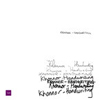 Youth and painfully melodramatic vocals don't spell out "genius" in big, bold letters. While much of the music that this 17 year-old old writes sounds nice (in terms of production), many of his songs are covered in a too-sweet glow that renders all the glorious fuzz and inherent beauty of his guitar work null. Connor Kirby-Long makes music full of good ideas: at times his arrangements hint at a desire to push his own songwriting abilities forward, but all too often this results in a stifling inertia where nothing goes anywhere. There's huge washes of electronic buzz permeating every corner of every song, but this isn't enough to carry the record all by itself.
Youth and painfully melodramatic vocals don't spell out "genius" in big, bold letters. While much of the music that this 17 year-old old writes sounds nice (in terms of production), many of his songs are covered in a too-sweet glow that renders all the glorious fuzz and inherent beauty of his guitar work null. Connor Kirby-Long makes music full of good ideas: at times his arrangements hint at a desire to push his own songwriting abilities forward, but all too often this results in a stifling inertia where nothing goes anywhere. There's huge washes of electronic buzz permeating every corner of every song, but this isn't enough to carry the record all by itself. Ever since unleashing the amazing one-two punch of But What Ends When the Symbols Shatter? and Rose Clouds of Holocaust, Douglas P. has been creatively floundering. His teaming with Albin Julius of Der Blutharsch yielded two albums that abandoned all of Death in June's usual subtlety and atmosphere in favor of overblown orchestral loops littered with samples from Leni Riefenstahl films and filled with laughable lyrics about Kristallnacht and anal sex. Then came the nadir, 2001's All Pigs Must Die, a prolonged screed against the now-defunct World Serpent Distribution that played like a vicious self-parody. Now comes the new album, a collaboration with fellow fascist sympathizer Boyd Rice. I might have expected them to produce some kind of martial epic extolling the virtues of Bush's imperialist wars, but instead they opt for a more personal album, a return of sorts to the guitars-and-windchimes sound that characterizes classic Death in June. As could be expected, every track is overloaded with excessive echo and reverb, and most are scattered with dialogue snippets from cult films, a familiar DIJ tactic. Unfortunately, Douglas P. has not learned any new chords, recycling the same dull strumming he's been churning out for twenty years. Boyd Rice provides vocals for most of the tracks, in his familiar I-can't-bothered-to-sing monotone. "Sunwheels of My Mind" is almost clever, a solar-centric adaptation of Dusty Springfield's classic "Windmills of My Mind." The album's lyrics deal primarily with the passage of time (punctuated by the Alarm of the title) and a preoccupation with solar imagery. It's the old familiar sun = light = Lucifer = Satan = power equation, a fairly juvenile symbolic conceit coming from a pair of middle-aged men. All that being said, I still liked this much, much better than All Pigs Must Die or the recent Wolf Pact album. It's a big improvement over Nazi tape-loops and boring personal vendettas, but its appeal is largely nostalgic—it reminds me of a time when DIJ were slightly relevant. At this point, I'm not holding out much hope that Douglas P. will ever come up with another truly worthwhile album.
Ever since unleashing the amazing one-two punch of But What Ends When the Symbols Shatter? and Rose Clouds of Holocaust, Douglas P. has been creatively floundering. His teaming with Albin Julius of Der Blutharsch yielded two albums that abandoned all of Death in June's usual subtlety and atmosphere in favor of overblown orchestral loops littered with samples from Leni Riefenstahl films and filled with laughable lyrics about Kristallnacht and anal sex. Then came the nadir, 2001's All Pigs Must Die, a prolonged screed against the now-defunct World Serpent Distribution that played like a vicious self-parody. Now comes the new album, a collaboration with fellow fascist sympathizer Boyd Rice. I might have expected them to produce some kind of martial epic extolling the virtues of Bush's imperialist wars, but instead they opt for a more personal album, a return of sorts to the guitars-and-windchimes sound that characterizes classic Death in June. As could be expected, every track is overloaded with excessive echo and reverb, and most are scattered with dialogue snippets from cult films, a familiar DIJ tactic. Unfortunately, Douglas P. has not learned any new chords, recycling the same dull strumming he's been churning out for twenty years. Boyd Rice provides vocals for most of the tracks, in his familiar I-can't-bothered-to-sing monotone. "Sunwheels of My Mind" is almost clever, a solar-centric adaptation of Dusty Springfield's classic "Windmills of My Mind." The album's lyrics deal primarily with the passage of time (punctuated by the Alarm of the title) and a preoccupation with solar imagery. It's the old familiar sun = light = Lucifer = Satan = power equation, a fairly juvenile symbolic conceit coming from a pair of middle-aged men. All that being said, I still liked this much, much better than All Pigs Must Die or the recent Wolf Pact album. It's a big improvement over Nazi tape-loops and boring personal vendettas, but its appeal is largely nostalgic—it reminds me of a time when DIJ were slightly relevant. At this point, I'm not holding out much hope that Douglas P. will ever come up with another truly worthwhile album. While comparisons to Cold Cave are going to be somewhat inevitable in this day and age, this four track EP from Clockcleaner vocalist/guitarist John Sharkey III embraces the new wave nostalgia to some extent, but the result is closer to early '80s death rock than the more synth heavy projects, owing far more to the likes of Christian Death than New Order.
While comparisons to Cold Cave are going to be somewhat inevitable in this day and age, this four track EP from Clockcleaner vocalist/guitarist John Sharkey III embraces the new wave nostalgia to some extent, but the result is closer to early '80s death rock than the more synth heavy projects, owing far more to the likes of Christian Death than New Order.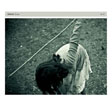 Having been stalwarts in the Japanese electroacoustic microsound scene for over a decade now, the quartet has always focused on unifying the usually disparate worlds of laptop based programming and improvised organic music. For their second release on the 12k label, they have done exactly that, marrying acoustic guitar with software patches, all presented in a warm, post-rock influenced analog audio bath.
Having been stalwarts in the Japanese electroacoustic microsound scene for over a decade now, the quartet has always focused on unifying the usually disparate worlds of laptop based programming and improvised organic music. For their second release on the 12k label, they have done exactly that, marrying acoustic guitar with software patches, all presented in a warm, post-rock influenced analog audio bath.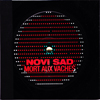 After successful releases on Sedimental and Tilt Recordings Thanasis Kaproulias was invited to the venerable VPRO Radio to perform a piece live, and unsurprisingly it has been released on the Staalplaat label for the rest of the world to hear. The single 47 minute track covers the composer’s sound as it is being refined, capturing elements of other artists such as Francisco Lopez and Bernhard Gunter, but still retaining an identity all his own.
After successful releases on Sedimental and Tilt Recordings Thanasis Kaproulias was invited to the venerable VPRO Radio to perform a piece live, and unsurprisingly it has been released on the Staalplaat label for the rest of the world to hear. The single 47 minute track covers the composer’s sound as it is being refined, capturing elements of other artists such as Francisco Lopez and Bernhard Gunter, but still retaining an identity all his own. The debut release from this synthesiser duo of Andrew Fogarty and Ivan Pawle is a raw but ultimately unsatisfying release which fails to capture the full potential of the group. The basic ingredients are here but they have not come together yet. That being said, this is far from a bad release but based on this EP alone there is not a lot to separate Boys of Summer from the countless other CD-R/tape culture groups out there.
The debut release from this synthesiser duo of Andrew Fogarty and Ivan Pawle is a raw but ultimately unsatisfying release which fails to capture the full potential of the group. The basic ingredients are here but they have not come together yet. That being said, this is far from a bad release but based on this EP alone there is not a lot to separate Boys of Summer from the countless other CD-R/tape culture groups out there. Expanded to a three piece, this second EP from Dublin’s Boys of Summer hits all the spots that V failed to tickle. With a far richer palette of tones at their disposal, the group offer an immensely satisfying journey through the dustier regions of that piece of meat between the ears that calls itself a brain. Like transmissions from another planet, these three pieces are alien sounding and utterly bewitching.
Expanded to a three piece, this second EP from Dublin’s Boys of Summer hits all the spots that V failed to tickle. With a far richer palette of tones at their disposal, the group offer an immensely satisfying journey through the dustier regions of that piece of meat between the ears that calls itself a brain. Like transmissions from another planet, these three pieces are alien sounding and utterly bewitching. Despite being best known for being half of Cluster, Hans-Joachim Roedelius’ career outside of that group has been even more prolific. Throughout the '80s he released as many albums as I have fingers and most of them are out of print. Thankfully Bureau B are continuing their amazing job of reissuing the Cluster-related back catalogue with this and a Dieter Moebius solo effort out this month. Here Roedelius is in fine form, surpassing himself with this fine selection of melodious pieces. Mixing a very ear-friendly approach to music making with some genuinely thrilling sounds, this album is one of the best things he’s put his name to (even beating all but the most classic releases he’s been associated with).
Despite being best known for being half of Cluster, Hans-Joachim Roedelius’ career outside of that group has been even more prolific. Throughout the '80s he released as many albums as I have fingers and most of them are out of print. Thankfully Bureau B are continuing their amazing job of reissuing the Cluster-related back catalogue with this and a Dieter Moebius solo effort out this month. Here Roedelius is in fine form, surpassing himself with this fine selection of melodious pieces. Mixing a very ear-friendly approach to music making with some genuinely thrilling sounds, this album is one of the best things he’s put his name to (even beating all but the most classic releases he’s been associated with). The solo project of Sami Hynninen is by turns slightly creepy, unexpectedly profound, and quite hilarious as his unwieldy guitar-based songs and wild imagery reference necrophilia, rainbows, sado-masochism, bunnies and fart sniffing.
The solo project of Sami Hynninen is by turns slightly creepy, unexpectedly profound, and quite hilarious as his unwieldy guitar-based songs and wild imagery reference necrophilia, rainbows, sado-masochism, bunnies and fart sniffing. First released in 1984, this album represents Dieter Moebius’ first foray into solo composition after over a decade playing with some of the giants of the German avant garde in the 1970s. There’s always a danger with serial collaborators that they cannot reach the same heights as when they are supported by other artists but Moebius proved that he could hold his own with this gorgeous little album. Although it sounds exactly as expected based on his previous collaborations, it is far from retreading old ground as you can get. Each of the pieces are packed with crystalline melodies set to precise beats and rhythms, all finely crafted and comforting in their familiarity.
First released in 1984, this album represents Dieter Moebius’ first foray into solo composition after over a decade playing with some of the giants of the German avant garde in the 1970s. There’s always a danger with serial collaborators that they cannot reach the same heights as when they are supported by other artists but Moebius proved that he could hold his own with this gorgeous little album. Although it sounds exactly as expected based on his previous collaborations, it is far from retreading old ground as you can get. Each of the pieces are packed with crystalline melodies set to precise beats and rhythms, all finely crafted and comforting in their familiarity.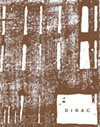 Hailing from Vienna, this relatively new trio has refined their approach to a post-rock and ambient influenced sound that, unlike many of their contemporaries, focuses more on the live collaboration to develop their sound, and not as much on DSP processing and effects laden sound.
Hailing from Vienna, this relatively new trio has refined their approach to a post-rock and ambient influenced sound that, unlike many of their contemporaries, focuses more on the live collaboration to develop their sound, and not as much on DSP processing and effects laden sound. As Imminent Starvation, Olivier Moreau famously trashed his mixing board after the completion of 1999’s Nord and gave the pieces out in a special collector’s edition. Now, after spending time with Synapscape and putting out a few 7” singles, he has returned with a new album that shows he hasn’t missed a step in his near decade hiatus.
As Imminent Starvation, Olivier Moreau famously trashed his mixing board after the completion of 1999’s Nord and gave the pieces out in a special collector’s edition. Now, after spending time with Synapscape and putting out a few 7” singles, he has returned with a new album that shows he hasn’t missed a step in his near decade hiatus. Triumphantly unfazed by the fact that it is no longer 1950, Francisco López has birthed a sprawling and ambitious double album of undiluted, unabashed musique concrète. Machines is industrial music in the purist sense, as López limited himself strictly to recordings taken from various pieces of mechanical equipment, then masterfully sculpted them into meticulously composed symphonies of clanking and whirring machinery.
Triumphantly unfazed by the fact that it is no longer 1950, Francisco López has birthed a sprawling and ambitious double album of undiluted, unabashed musique concrète. Machines is industrial music in the purist sense, as López limited himself strictly to recordings taken from various pieces of mechanical equipment, then masterfully sculpted them into meticulously composed symphonies of clanking and whirring machinery. The list of singer-songwriters as raw as Emma Louise "Scout" Niblett is very short. Names like P.J. Harvey and Patti Smith come to mind when thinking of her and, in some ways, both of them are more suitable reference points than the grunge bands Scout has named-checked as her influences. On The Calcination of Scout Niblett she sounds as severe as she ever has and starker, too. But, if Scout began her career under the wings of Nirvana and Sonic Youth, she's long since graduated to something more original, less obvious, and much, much more ominous.
The list of singer-songwriters as raw as Emma Louise "Scout" Niblett is very short. Names like P.J. Harvey and Patti Smith come to mind when thinking of her and, in some ways, both of them are more suitable reference points than the grunge bands Scout has named-checked as her influences. On The Calcination of Scout Niblett she sounds as severe as she ever has and starker, too. But, if Scout began her career under the wings of Nirvana and Sonic Youth, she's long since graduated to something more original, less obvious, and much, much more ominous.
